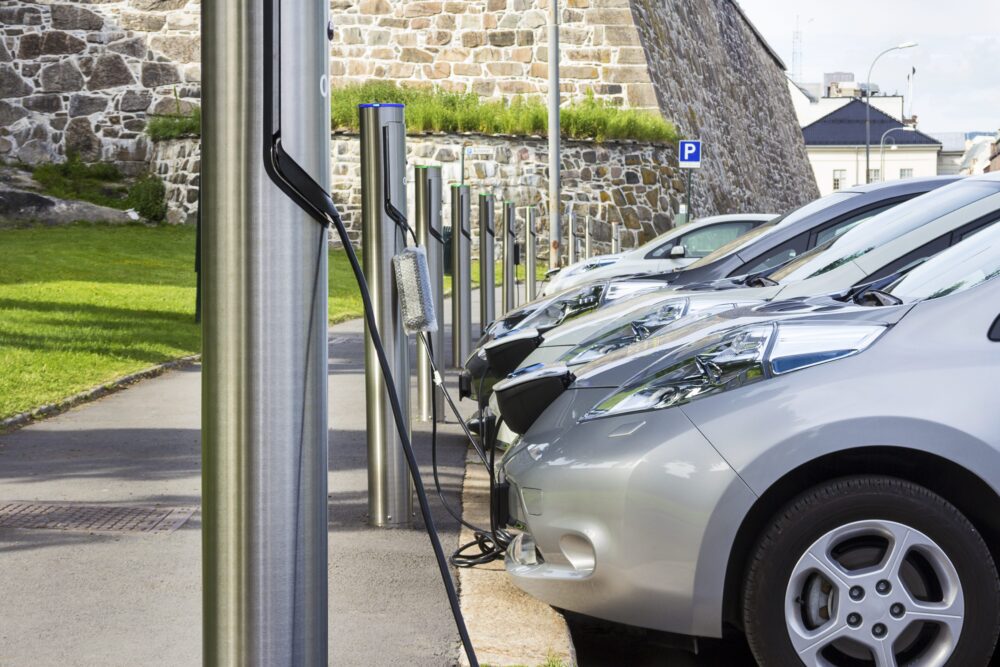The Texas Department of Transportation (TxDOT) hopes long-distance travel in electric vehicles will become much easier and more convenient for Texans over the coming years. Texas is expected to spend $408 million on electric vehicle (EV) infrastructure and plans to add enough EV charging stations throughout the state to support 1 million electric vehicles.
In a draft plan released this month, the Texas Department of Transportation broke down a five-year plan to create a network of chargers throughout the state, starting with building stations along main corridors and interstate highways before adding them to county seats in rural areas.
To satisfy Texas’ 50-mile U.S. Federal Highway Administration (FHWA) requirement, the state plans to add around 48 new charging stations during the first year of implementation. The state’s long-term goal is to place an EV charging station every 50 miles along most interstate highways and main corridors.
Each charging station will include multiple stalls with 150-kilowatt high-powered chargers that can bring most electric vehicles from 10% to 80% in about half an hour, according to the report. In addition, many charging stations will feature a combination of solar and battery equipment to supplement power supplies.
Earlier this year, Gov. Greg Abbott stressed the importance of including rural areas in TxDOT’s plan.
“Texas’ sheer volume of roadway miles leaves ample opportunity for EV charging deployment,” Abbott wrote. “The plan should ensure that every Texan can access the infrastructure they need to charge an EV.”
Chandra Bhat is a University of Texas transportation engineering professor and the director of the U.S. Department of Transportation’s Center on Data-Supported Transportation Operations and Planning.
Bhat said he is optimistic that more people will adopt electric vehicles in Texas due to the planned infrastructure upgrades.
“We will see a clear uptick in the next two or three years, I believe,” he predicted. “And if we get an announcement that batteries are going to be lasting longer and are going to be less expensive, you’re gonna see them bought by the droves.”
U.S. Secretary of Energy Jennifer Granholm says the charging stations are an opportunity for private businesses and state utilities.
“A lot of utilities are seeing the electrification of the vehicles as an opportunity to provide resilience to the grid. Because what you’re doing, of course, is adding batteries and energy storage onto the grid as well as using the grid when you’re charging,” Granholm said. “So, if you can sell electrons back and forth from the grid using those batteries, that’s a huge opportunity.”
However, a survey by the University of Houston (UH) and Texas Southern University (TSU) found little enthusiasm for electric vehicles.
“The survey found that few Texans currently owned or leased an electric vehicle, and only about one in 10 said they would be very likely to consider owning or leasing one in the future,” said Gail Buttorff, instructional assistant professor at the UH Hobby School of Public Affairs.
“When we broke it down by generation, the majority of Gen Z and Millennial Texans said they were either very or somewhat likely to consider purchasing or leasing one in the future. And the opposite was true of the two older generations surveyed,” Buttorff added.
The high cost of purchasing electric vehicles and the scarcity of charging stations were cited by survey respondents as reasons for not supporting electric vehicles.
“Dividing along politics, a preference for gas vehicles was cited by almost twice as many Republicans (49%) as Democrats or Independents (28% in each case). Mileage range per charge was a concern of more Republicans and Independents (40% each) than Democrats (29%),” said Michael O. Adams, professor of political science and founding director of the Executive Master of Public Administration program at TSU’s Jordan-Leland School of Public Affairs.
The funding to build EV stations comes from the federal Infrastructure Investment and Jobs Act passed last year, which is estimated to allocate about $408 million over five years to Texas to expand its electric vehicle charging network. No funds from the state budget will be used.
For Texas to receive the funds, TxDOT must submit a finalized plan by August 1 to the Federal Highway Administration. Officials plan to award construction contracts beginning in January.
Less than 1% of all vehicles registered to Texans are EVs, according to a TxDOT report. As of May 31, Texas had approximately 129,010 registered EV owners across 233 of the 254 counties across Texas.

